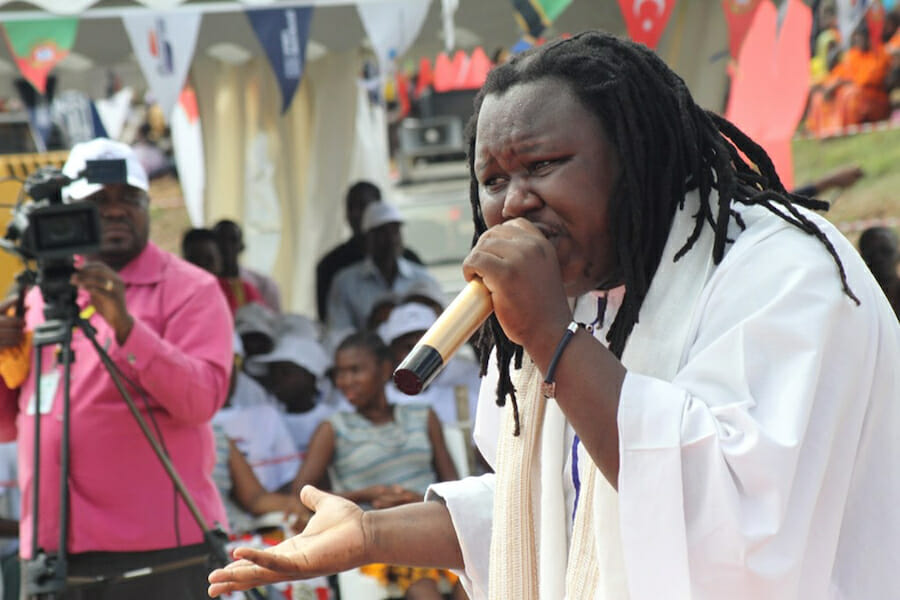
Culture
Cultural Diversity Seen Through the Eyes of African Artists
In July 2012, I wrote the article “Artistic Endeavor: Can Change the Face of Africa,” after attending the Sundance Institute Theatre Lab production of “Africa Kills Her Sun,” or “Afrika Inaua Mwangaza Wake” in Kiswahili.
The play had a cast of three African actors and one American, who expressed the plight of the Ogoni people in Nigeria under the dictator Sani Abacha, whose regime was noted for widespread corruption, human rights abuses, and the suppression of free speech. The Sundance Institute Theatre Lab in collaboration with African playwrights and actors has pursued stories such as the one by Ken Saro-Wiwa based on a condemned man’s last letter to his beloved. It was adapted into Kiswahili, combining slam poetry and storytelling, talking about the corruption and inhumane treatment that had taken place in Nigeria.
The 2012 Theatre Lab selected eight plays with actors from Tanzania, Uganda, Nigeria, New York, Chicago, and Hawaii. The play “Africa Kills Her Sun” was one of those selected. Sundance’s goal has been to help develop actors, writers, directors, musicians, composers, and producers, and give them the opportunity to network with American theatre experts; share their rich African cultures. Americans need to know more about this far away continent, and its multi-cultural tribal history going back hundreds of years.
Africa continues to struggle with injustices, a legacy from the colonial era. Power and wealth are still held in a few hands. Poverty, corruption, violence and disease are still endemic in many parts of Africa. Writers and performing artists through their inspired works are able to bridge social, religious, and cultural divides using the common language of art, to explore and express these common humanity issues. The Price Family Foundation provided a grant to the Sundance Institute East Africa (SIEA) Theatre Initiative, which directly supports African artists, and ensures that their vibrant and critical stories are told. The SIEA also creates cultural exchanges between U.S. artists and African writers, directors, and performers. The SIEA has supported the artistic endeavors of African artists for over eleven years, with more than fifty participating in projects.
In November 2013 the SIEA held a workshop in Zanzibar, where four African Fellows and their projects were invited to participate. They came from Uganda, Rwanda, Ethiopia, and Kenya. In addition there were five advisors–two each from South Africa and Rwanda and one creative adviser from the United States. A team of seventeen actors and support staff participated in the two-week Lab. The next Theatre Lab will be held at the Sundance Resort in Utah in July 2014, with approximately twenty Fellows attending, including four from Africa. Eight projects will be work-shopped with creative advisors, actors, program and operational staff–over ninety people will be participating.
In November 2014 the SIEA will conduct a workshop in Kampala, Uganda in partnership with the Bayimba Festival. Up to fifteen alumni will lead a group of twenty Kampala-based theatre artists. The Bayimba Festival is produced by Kampala-based Faisal Kiwewe, a graduate of the Kennedy Center’s Arts Management program. In collaboration with Deborah Asiimwe, a Ugandan playwright, the workshop will produce “Desperate to Fight” by writer Meaza Worku Berehanu of Ethiopia. The story is about relationships, love, and marriage–gender struggles in contemporary Addis Ababa. Philip Himberg the artistic director of the Sundance Theatre Lab will direct the play.
At the 2014 Sundance Film Festival in Park City, Utah last week, several African films were showcased, which further exposes Americans to this vast continent. Over the years Africans have suffered inequities at the hands of dictators and autocratic rulers, corruption and inhumane abuses. There are however some positive effects of conflict resolution, as depicted through the eyes of actors, writers, and producers.
The Sundance Institute has had a major impact on a generation of African artists, as well as American artists, through cultural exchange programs. Sundance has been an advocate of understanding the cultural diversity and important issues facing Africa. Our Foundation applauds the vision the Sundance Institute portrays: “What Africa can become with artistic endeavor.”

